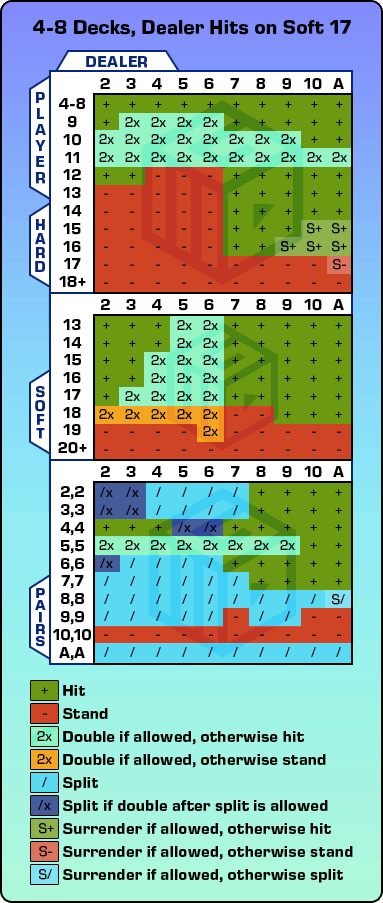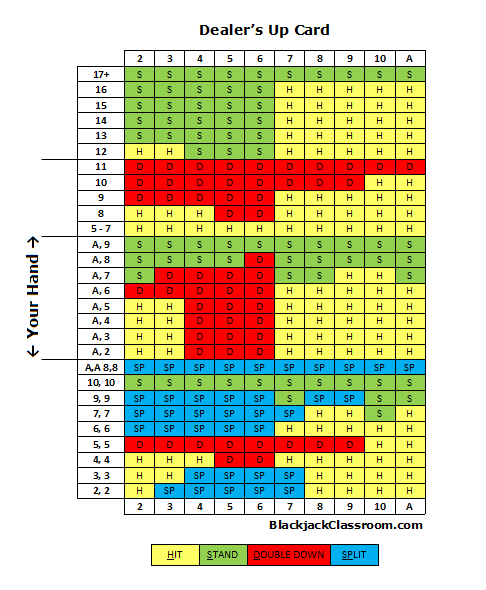Blackjack Stand On 17
In general, you should always stand on 17 or higher unless there is an Ace in your hand. If the dealer has a low or medium card, standing with a hand lower than 17 is often the right play. Double: Doubling is a more advanced option than hitting, and learning when to double and when just to hit is an essential part of becoming a blackjack pro. If you are dealt a pair of 8s or Aces, split them. A pair of 8s totals 16; it is the worst blackjack hand and the Basic Strategy will have you stand in most cases. Vice versa, a pair of 10-value cards totals 20; it is a good hand to risk it. Never stick to the ‘dealer rules.’ Dealers must hit on 16 and stand on 17. In basic blackjack strategy, the worldwide consensus supports the same idea; never hit on 17. Players are advised to always stand on a hand of 17 (and higher), as hands of this value are considered strong enough, while the chances of improving your total is slim, and busting is likely.
Blackjack hit or stand on a hard hand cheat sheet. If you’re playing a multi-deck game and you have a hard 17, double down instead of taking a hit. You’ll need to make some minor tweaks to our strategy, depending on the number of decks and rules you’re playing with. The best blackjack rules include the dealer standing on soft 17, but it seems most casinos hit that total. What's the difference in odds of winning between standing and hitting with soft 17? And why is one better than the other?
If I just answered my own question, and this works, I'm surprised that even BS players don't use this. Wouldn't be hard to count one hand and an upcard with Hi-Lo. Very very small gain you say? Yes, but we all know many players wish they could stand with 16s, so I'm sure many players would like this.
I wonder what other deviations there are that could be used in an 8 deck game where it's shuffled after every hand. I wouldn't be surprised if this is the only one, not counting hands where you have a ridiculous amount of cards that make up your hand.
I just answered my own question
BS players do use this.
Standing or hitting on 16 vs. a 10 in the long run will make a negligible difference either way. I know some blackjack players who will always stand on 16 v. 10 as a cover play.Standing or hitting on 16 vs. a 10 in the long run will make a negligible difference either way. I know some blackjack players who will always stand on 16 v. 10 as a cover play.
 If you're playing 1 vs 1, by yourself online, why not? Why not make that extra penny every few hands? Now if you're sitting there figuring it out for 30+ seconds, then ya, but this is easy.
If you're playing 1 vs 1, by yourself online, why not? Why not make that extra penny every few hands? Now if you're sitting there figuring it out for 30+ seconds, then ya, but this is easy.
Personally I always hit 16 vs 10, whereas I vary whether to hit 12 vs 4 and 13 vs 3. btw if someone does know, given the natural variation of the count, whether one is better to hit or stand (assuming flat stakes) - i.e. whether what you gain by hitting when the count's bad is larger than the loss when count's good or vice versa.
No, what you gain by hitting is less than what you lose on average. That's exactly the reason why basic strategy says stand.
I feel like this horse has been dead an buried !!
We know that w/ a 10 up, the dealer will make 17+ ( 71 % of the time) and only bust (21 % of the time)
So by NOT hitting, you will only win 2/10. Much rather catch a A-5, love catching a 5 w/ a big bet out , or bust !! Much more exciting !!
Single-deck blackjack which is played with only one standard deck of cards and the dealer stands on a soft 17.
In a single deck blackjack game, cards are always dealt face down for the initial hand. Subsequent cards will be dealt face up. It’s important for you to learn the basics of blackjack strategy before heading to the casino to play, whether you want to try a few rounds for fun or to learn to be an expert card counter. Single deck blackjack’s rules and conditions may vary according to the casino where you play.

In blackjack terminology, “soft 17” is a hand composed of a Six plus an Ace counted as 11 points, giving a total of 17. “Hard 17” is a hand that adds up to 17 points, not including an Ace counted as 11 (for example, a Seven plus a King).
In some versions of blackjack, the dealer hits on soft 17. In others, he stands on both hard and soft 17. To double check the rule for the version you are playing, you can check the blackjack table layout. There you will see written either: “Dealer Hits Soft 17” or “Dealer Must Stand on all 17,” and this will give you your answer. When the dealer hits on soft 17, there will be a small increase in the house edge.
Blackjack Dealer Stand On 17
Click for information on history, how to play, terminology/glossary, table layout and blackjack card counting.